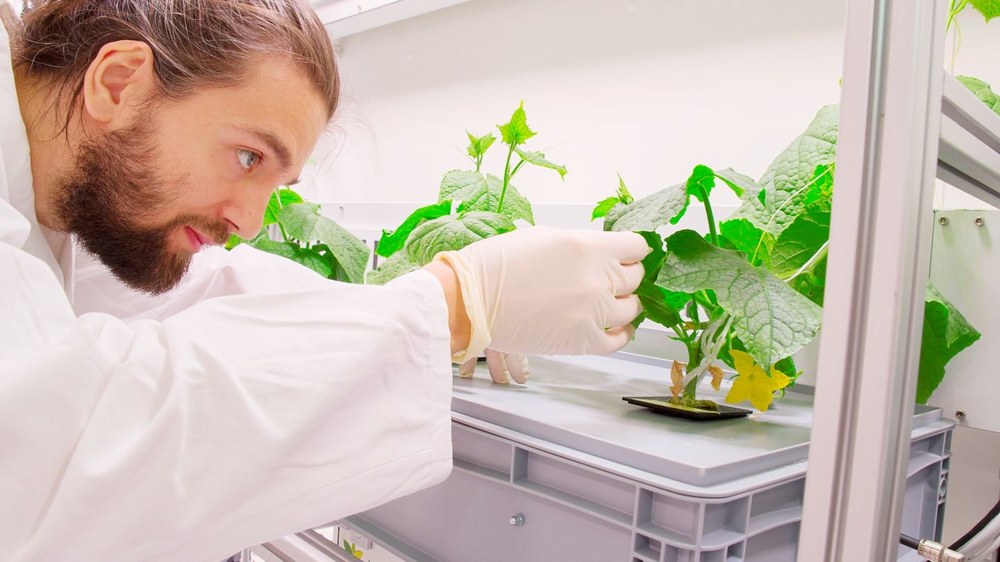EDEN Initiative
In 2011 the DLR Institute of Space Systems launched its research initiative called EDEN. The research initiative focuses on Bio-regenerative Life Support Systems (BLSS), especially greenhouse modules, and how these technologies can be integrated in future space habitats.
The cultivation of higher plants can contribute to all major aspects within BLSS and represents an all-in-one-approach, not accomplished by any single physical/chemical system.
The most apparent benefit is the provision of food. Fresh food provides essential vitamins, minerals and other useful macromolecules such as bioactive compounds to support crew health, and thereby functions as a countermeasure for the stresses associated with deep space exploration. Considering the symbiotic relationship between humans (carbon dioxide emitters) and plants (carbon dioxide absorbers), plant growth modules will also provide valuable oxygen to the crew and remove harmful carbon dioxide. Through the exploitation of plant evapotranspiration, the deployment of plants can furthermore contribute to wastewater recycling. Astronaut physical and psychological well-being is vital to mission success, especially during long duration missions with constant isolation in a highly-integrated machinery environment, including the dependency on these machines. The visual appearances of plants (‘nature’) as well as activities with them (‘gardening’) and associated design and architectural solutions enhance the psychological well-being of the crew.
From a long-term perspective, bio-plastic, latex or other high value compounds that can be generated from plants, will also help reduce consumables and increase mission autonomy. Transforming bio-plastics into granulates and using them with the latest 3D printing techniques, opens a wide variety of in-situ production capabilities.
It is the goal of the EDEN research team to further advance the latest cultivation technologies and to adjust these developments into space-rated applications. Even though present scenarios for future human missions to Moon and Mars are still several years from coming to fruition, the work to develop these technologies needs to start today. Only this way, highly-reliable and resource-efficient BLSS will be ready for implementation into the mission architecture for humanity’s journey to the Moon and Mars.
Research Focus
The research focus of the EDEN group is the evaluation and design of plant growth systems for integration into planetary habitats (Moon, Mars), where these systems will work in close conjunction with physical/chemical life support systems. The required Controlled Environment Agriculture (CEA) technologies and operation procedures are developed and tested within the Space Habitation Plant Laboratory. The primary ambition is the achievement of highly reliable plant cultivation systems with maximum biomass output of crops, produced in a resource-efficient manner (power, water, nutrients).
CEA is a combination of engineering, horticultural science and information technology to design highly-efficient plant growth systems. Through the implementation of technologies that carefully control and optimize the provision of nutrients (e.g. H2O, pH, electrical conductivity, as well as soilless cultivation), environmental conditions (e. g. temperature, relative humidity, concentration of CO2 & O2), and light, including spectral composition, it is now possible to achieve higher yields and shorter growth cycles. Through CEA, even the exact control of food quality is possible (e.g. taste, enrichment of useful substances).
Starting from these facts, the EDEN research initiative focuses on planetary scenarios, where the envisioned greenhouse modules will be integrated in the general planetary habitat infrastructures.
The EDEN Initiative concentrates its research ambition on the integration of CEA technologies and the actual production process of crops. Here, all necessary inherent technological-, cultivation-, handling-, and operation challenges are investigated by the initiative. These plant cultivation challenges are the primary research focus, rather than the biological understanding of the system plant, which is be the domain of plant biology.
The EDEN research group operates an experimental greenhouse facility near the polar research station Neumayer III of the Alfred Wegener Institute in Antarctica as part of the EDEN ISS project. In a semi-enclosed greenhouse system, innovative technologies and processes for the long-term stay of humans in space are tested in so-called analogue missions under Martian/Moon-like conditions regarding harsh environments, logistics and crew situations. The EDEN ISS greenhouse facility is open for international collaborative projects and experiments.
In addition to research and development projects focused on future space missions, the EDEN group is also actively engaged in potential terrestrial applications. Here the MEPA project (German: Mobiles Entfaltbares Pflanzen-Anbausystem) is worth mentioning. The aim of the MEPA project is to develop a cost-effective, modular, quickly transportable and deployable greenhouse system for use in humanitarian aid operations (for example in refugee camps).
Space Habitation Plant Laboratory
In 2014, the Space Habitation Plant Laboratory (EDEN-Lab) was opened. The main driver for the establishment of this research laboratory was the necessity to gather hands-on experience with the cultivation of higher plants in (semi) closed-loop environments. The laboratory offers a unique set of plant cultivation chambers for the performance of growth studies and the development of the necessary supporting technologies. In particular, numerous Controlled Environment Agriculture (CEA) technologies are tested within the laboratory. In close collaboration with industry, universities, and research institutions, the EDEN team conducts research in order to improve the performance and reliability of food production systems in space.

Downloads
Miscellaneous
Think-Cell is used to create our graphics. "To create complex diagrams, such as line, bar, waterfall, mecko and Gantt charts, the Institute for Business Management in FB 12 of the University of Münster uses the Microsoft Office Add-In think-cell. Automatic updates between Microsoft Excel and Microsoft Powerpoint are offered in the application in a standardized way. The automatic creation, administration and maintenance of agenda and table of contents are of course also possible. Visit the think-cell website for more information. Currently think-cell is looking for creative and capable C++ developers. If you are interested please contact hr(at)think-cell.com."



